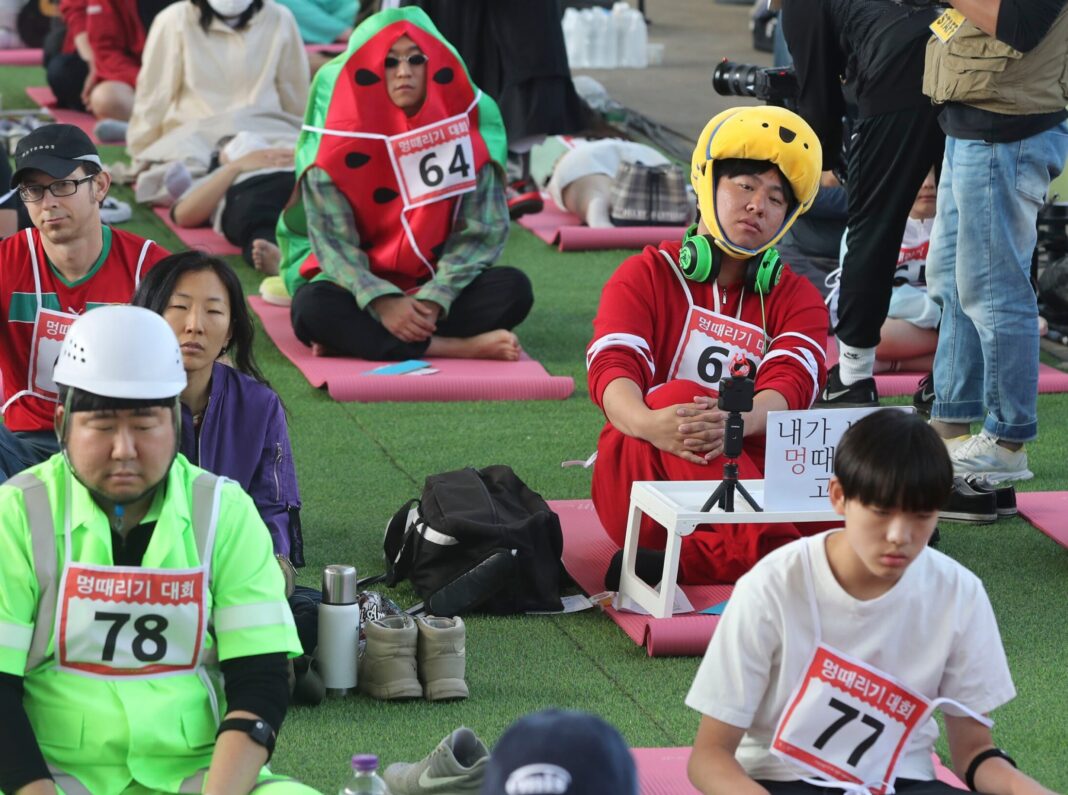BTN News: In South Korea, where the culture of hard work is deeply ingrained, a unique competition called “Space-Out” challenges the societal norm of constant productivity. Launched in 2014, the contest aims to emphasize the value of pausing, relaxing, and allowing oneself a break without feeling guilty. This message resonates particularly strongly in South Korea, a country known for its demanding work culture. For instance, last year, the government under Yoon Suk Yeol attempted to increase the legal maximum work hours from 54 to 69 per week, sparking widespread public debate and protests, especially among young people.
This year’s winner of the Space-Out contest is Valentina Vilches, a Chilean doctor of integrative medicine who relocated to Seoul after experiencing burnout. Her story is rich in irony and serendipity. During the pandemic, Vilches developed a fascination with the Korean language, and through a language exchange on the Tandem app, she met her future husband, a Korean eager to learn Spanish. This virtual connection gave her the courage to move to Seoul, where she has been living for three years.
Vilches competed in the Space-Out contest to highlight the benefits of mental relaxation. Her stable pulse rate, measured by a bracelet all participants wear, won her the title among over a hundred contestants. The contestants’ appearances, postures, and motivations written on a board also played a part in the popular vote. Vilches wrote a simple yet profound message: “Life is very short, so make sure to live it.” She competed in her medical coat and with a stethoscope, symbolizing her identity, while others donned traditional Korean attire, Palestinian scarves, or even costumes like Homer Simpson.
In a society where the concept of “dolce far niente” (the sweetness of doing nothing) is often frowned upon and seen as laziness, Vilches’ victory and the contest itself are powerful statements. They challenge the notion that rest and inaction are signs of weakness. As the prolific actor and director Fernando Fernán Gómez once said, “I am very capable of doing nothing. If I had been an heir, I would have been perfectly fine doing nothing.”
The South Korean philosopher Byung-Chul Han, residing in Berlin, delves into this issue in his book “Vida contemplativa: elogio de la actividad” (2023). He argues that our obsession with productivity leads us to see inactivity as a deficit. This perspective is detrimental to mental health, a fact that Vilches observes in her patients. She notes that societal pressure to be constantly productive makes us overly demanding of ourselves, leading to burnout and a perpetual state of FOMO (fear of missing out).
Even leisure time is meticulously planned and executed, often adding more stress rather than providing relief. This compulsion for productivity invades all aspects of life, leaving no room for genuine freedom. Han concludes that under the compulsion of performance and production, true freedom is unattainable.
Camila Cañeque, a philosopher known for her performances focusing on passive acts like waiting, napping, sunbathing, or getting a massage, passed away earlier this year. Her work explored the artistic depth of rest as a form of self-care and a response to widespread exhaustion and existential meaninglessness.
These necessary pauses can range from minutes to several days. Buddhist silent retreats, where meditation is practiced for 14 hours a day over 10 days, offer opportunities for regeneration. Some, like Thoreau’s two-year stay at Walden Pond, choose longer periods for introspection.
Sabbatical years provide a chance for those caught in the system’s grind to rediscover their dreams and reconsider their life paths. Philosopher Azahara Alonso, in her book “Gozo” (2023), narrates her sabbatical year in Malta, emphasizing the rarity of such breaks for the working class, often dismissed as laziness. Alonso’s retreat allowed her to write the very work she is now known for, echoing Cicero’s philosophy that inactivity is essential for cultivating virtue.
Bertrand Russell, in his essay “In Praise of Idleness” (1932), argued for a four-hour workday, criticizing the modern work ethic that leads to overwork for some and deprivation for others. He suggested that instead of perpetuating this cycle, we should embrace idleness for a more balanced life.
In conclusion, embracing pauses and rest is a form of resistance against the relentless drive for productivity. It is crucial for mental health and personal fulfillment. As society gradually acknowledges the value of rest, contests like Space-Out and the philosophies of thinkers like Byung-Chul Han and Bertrand Russell offer a hopeful perspective on the importance of doing nothing.


